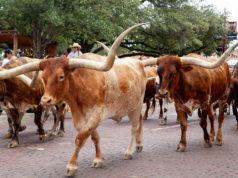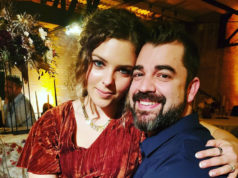It takes guts for a small company like Metropolitan Classical Ballet to try to mount a convincing production of a Soviet-era blockbuster like Spartacus, but the group met the challenge earlier this week in Bass Performance Hall.
MCB first tackled the three-act Bolshoi Ballet original in 2004, condensing the classic into two longish acts and using guest principals. This time around, regular company dancers took on the outsized solos, with the young Shea Johnson – who turned 22 the day after the performance – as the rebellious Roman slave. While he doesn’t own the role yet, like he does Acteon from Diana and Acteon, he gave a bold outline of the anguished fighter and danced enthusiastically along the way. His love duet with fellow slave Phrygia, exquisitely performed by Olga Pavlova, had strength to spare in the one-arm lifts and aerial flights. But the overall partnering seemed cautious and rough at times.
Andrey Prikhodko was a commanding Crassus, the Roman general who eventually puts down the slave revolt, and Marina Goshko was a properly sensuous Aegina, an ambitious courtesan who seeks to control the general for her own advancement.
Co-artistic director Alexander Vetrov, who performed Crassus many times during his 15-year career at the Bolshoi, staged the work. Unlike the Moscow company, MCB didn’t have 100-plus dancers to convey the piece’s epic sweep, though Vetrov managed admirably with his corps of nine women and six men – all handsomely turned out in rented Bolshoi costumes – to suggest the pageantry and power of the original. Aram Khachaturian’s film-score-like musical accompaniment was energetically conducted by Bernard Rubenstein.
The evening concluded with a revival of co-artistic director Paul Mejia’s Eight by Adler, a suite of vintage Broadway tunes that showcased Pavlova.











